What Vets Say About Feeding Raw Diet for Dogs
The Very Best Diet for Cats, According to Vets
If you have a cat, you know that they can be picky about their food. Just don't try to make them a vegetarian! (It's actually bad for their health).
Every editorial product is independently selected, though we may be compensated or receive an affiliate commission if you buy something through our links. Ratings and prices are accurate and items are in stock as of time of publication.
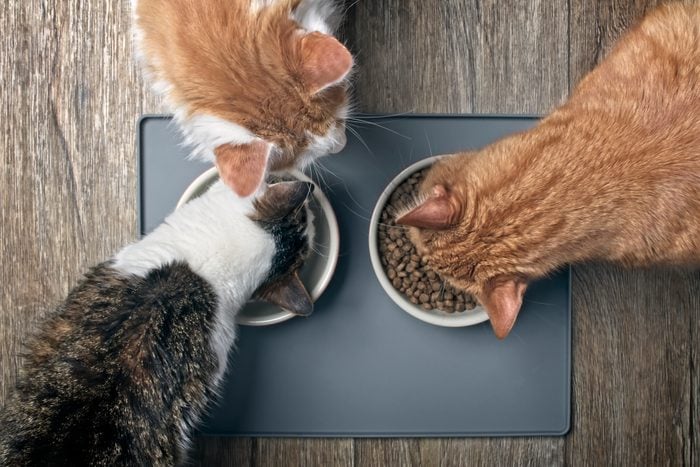 Thorsten Nilson/EyeEm/Getty Images
Thorsten Nilson/EyeEm/Getty Images
Cats need lots of animal-based protein
"While there isn't a single diet that is ideal for all cats, in general, most do best when they eat foods that are high in moisture and protein and relatively low in carbohydrates," says Jennifer Coates, DVM, a veterinarian for Chewy. "A study published in 2011 showed that when cats are given access to foods of different protein, fat, and carbohydrate concentrations they tend to self-select a diet that provides them with around 52 percent of their calories from protein, 36 percent from fat, and 12 percent from carbohydrates." Bottom line—there's no such thing as a vegetarian cat. Along with feeding your cat the best food, you'll also want to avoid these 12 common mistakes cat owners make.
ⓘ
Age definitely matters
One of the most important factors to consider when shopping for cat food is your cat's age. Different life stages mean different activity levels and nutritional needs. For example, kittens are generally far more active than their senior counterparts, and they also need additional nutrition to help them in their quick growing process. "Just as human babies don't eat the same foods as adult humans, nor should kittens and adult cats eat the same foods since they require different nutrients as they change over the years," says Brittany Carey, a cat specialist and manager at Cat Safari in San Francisco. "You may see cat food with the phrase 'for all life stages' in its description, but it's best to seek life-stage nutrition." We bet you never knew these things about your cat!
This high-quality kitten food is grain-free and made with real ingredients, like duck and turkey, and full of moisture and added vitamins and amino acids for a healthy immune system as they grow.
Shop Now
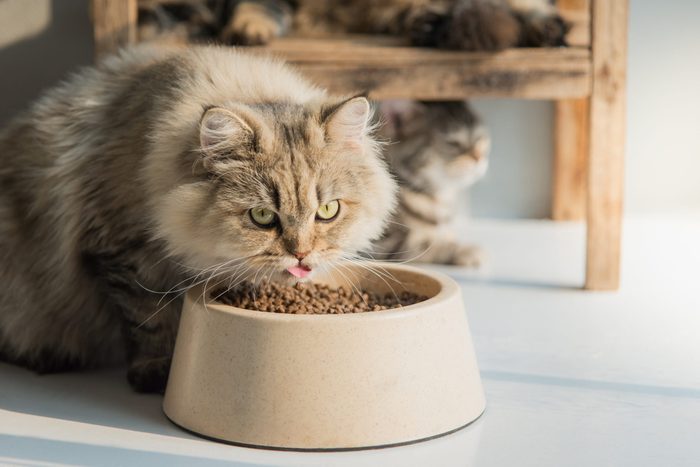 ANURAK PONGPATIMET/Shutterstock
ANURAK PONGPATIMET/Shutterstock
Your cats' nutritional needs can vary over time
In addition to buying food according to your cat's life stages, also consider any potential ailments or sensitivities they may acquire over time. For example, mother cats nursing their kittens require a much higher caloric diet, says the VCA, and some cats end up needing more simplistic diets due to allergies. Your vet can help you navigate these particular needs. These myths about cats are actually false.
Senior cats need food high in protein and moisture to support their renal systems while being lower in fat and calories to prevent weight gain, which can have adverse health consequences. For older indoor cats, this grain-free food is a great option.
Shop Now
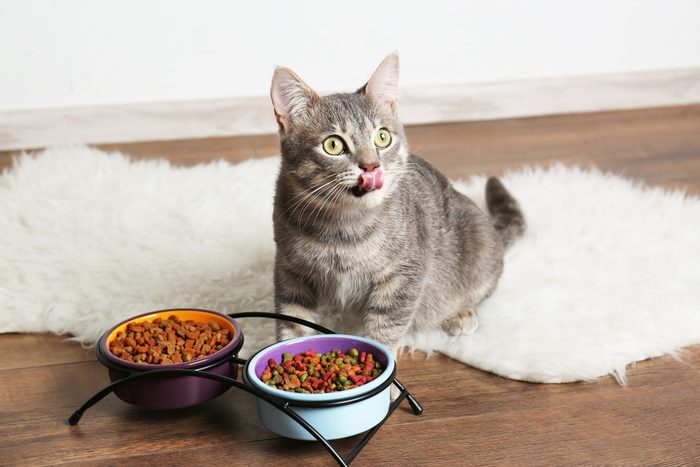 Africa Studio/Shutterstock
Africa Studio/Shutterstock
Wet food just might be better
Though quality ultimately matters, in general, wet food is the superior option for cats when choosing between canned wet food and dry kibble. "Typically, wet foods meet a cat's nutritional needs better than dry, but that may not be the case if the wet food in question is of very low quality," Dr. Coates says. Just make sure you're thoroughly cleaning your cat's bowl between every wet food feeding, since it can be a harboring ground for bacteria, one of the ways it could be making your cat sick.
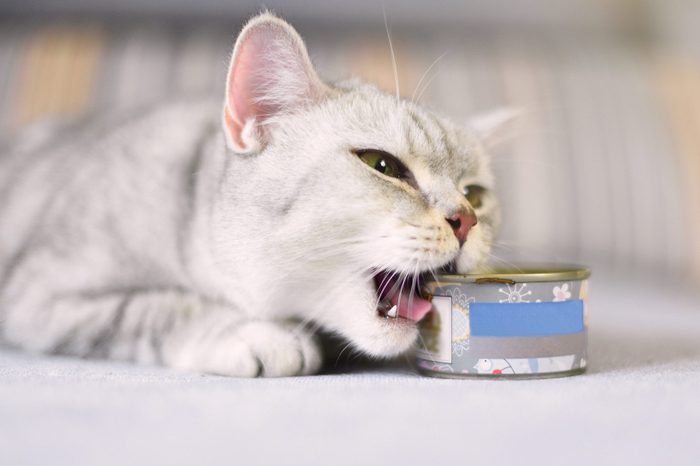 Waitforlight/Getty Images
Waitforlight/Getty Images
Beware of gimmicky labels
It makes sense that cat food brands want their product to stand out on the shelf, but be wary of gimmicky words such as "primitive," "ancestral," or "wild," says Dr. Coates. "These terms are pure marketing. Instead of looking for flashy words, pet parents must look closely at a food's label to determine whether it could be a good option." Does your cat dream about living its most wild life? Find out what cats dream about.
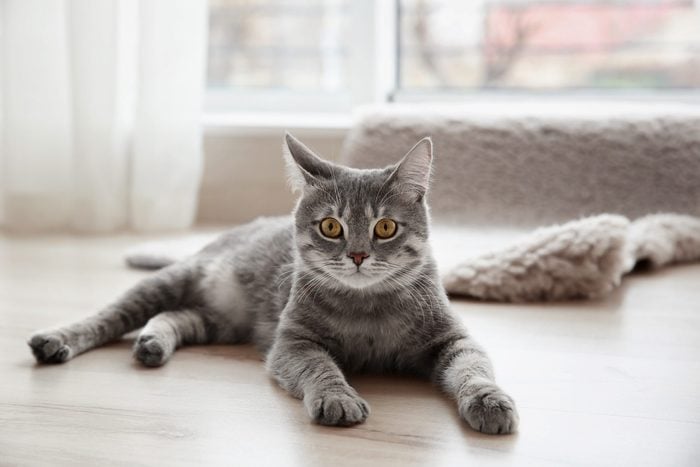 Africa Studio/Shutterstock
Africa Studio/Shutterstock
Cats should cool it on the carbs
As mentioned, cats are obligate carnivores that need high levels of animal-based proteins in their daily diet. Dr. Coates says, "Grains, and more generally carbohydrates, should only play a small role as a source of energy in a cat's diet. Fillers are ingredients that serve no nutritional purpose and should be avoided." Too many grains in a cat's diet can lead to malnutrition, obesity, organ issues, and GI tract issues. It's important to know the silent signs your cat is sick.
 Thorsten Nilson/EyeEm/Getty Images
Thorsten Nilson/EyeEm/Getty Images
Look for the AAFCO statement
"Instead of sweating over the ingredient list, pay attention to the nutrients in your cat food," says Carey. "Look for a statement from the Association of American Feed Control Officials (AAFCO) saying that the food is complete and balanced." Do you know what your cat means when they make these noises?
This nutritionally-dense fish-based grain-free cat food is AAFCO-approved and a great all-around option for most adult cats.
Shop Now
 279photo Studio/Shutterstock
279photo Studio/Shutterstock
Some human foods are OK occasionally
Though cats ought to stick primarily to packaged cat food, since it's formulated specifically to their dietary needs, you can give them a nice treat periodically, such as tiny morsels of tasty human food. "Small pieces of cooked meat or fish make wonderful treats for cats," says Dr. Coates. Other yummy treats include cooked egg, cantaloupe, and mashed sweet potato. Conversely, there's a long list of human foods your cat cannot eat, including chocolate and grapes.
 Monika Wisniewska/Shutterstock
Monika Wisniewska/Shutterstock
Cats really shouldn't eat dog food
At some point you might have wondered if cats can eat dog food—after all, they seem to look all the same—but the answer is not really. Dr. Coates says, "If your cat occasionally 'steals' a mouthful from your dog's bowl, you have nothing to worry about, but make sure that 90 percent or more of your cat's diet is made up of cat food." This is because, as outlined above, cats rely heavily on diets rich in animal-based protein. Dogs have an entirely different set of dietary needs, and therefore their food is formulated according to their nutritional satisfaction. Learn more about the best diet for dogs.
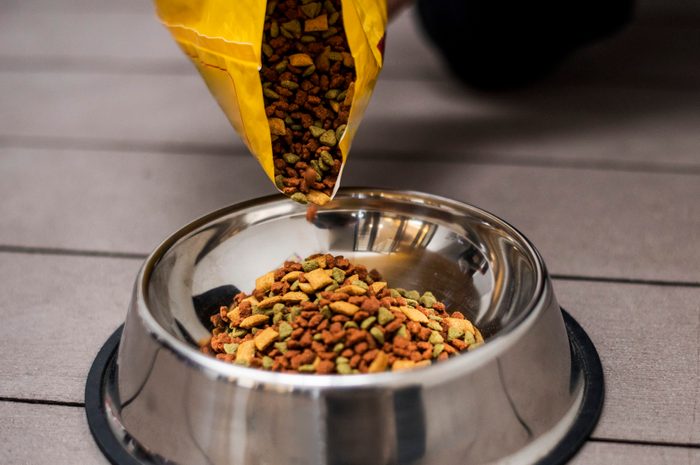 Rawpixel/Getty Images
Rawpixel/Getty Images
Buy food in smaller quantities
Those 30 and 40-pound bags of dry kibble, or entire flats of cat food, may be enticing budget-wise, but they're really intended for homes with multiple kitties. Aim for buying in quantities that can be used up in less than a month's time, and ideally within three weeks. Find out the things you do that your cat secretly hates.
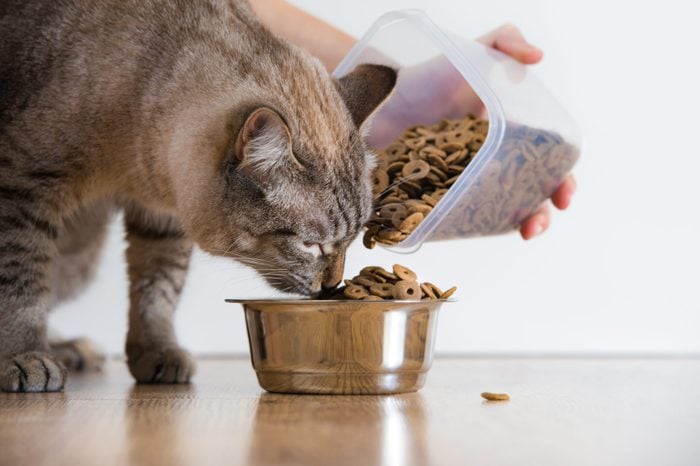 Milles Studio/Shutterstock
Milles Studio/Shutterstock
When and how you feed your cat matters
"Aside from the kind of food you're feeding your feline friend, knowing how much you feed them and when are important factors, as well," says Carey. "While it's popular to 'free-feed' cats and let them graze throughout the day, most veterinarians recommend feeding set quantities at the same times daily. Free-feeding can easily lead to obesity which in turn can lead to more severe health issues like joint disease and diabetes." This is how to understand your cat's behavior.
 Koldunov Alexey/Shutterstock
Koldunov Alexey/Shutterstock
Treats are exactly that—treats!
Cat treats, like human treats, are generally higher in calories and therefore ought to be given sparingly. The VCA website recommends using them strategically when training or curbing behaviors, or even as part of a bonding activity. If your cat ends up eating treats too often, it can disrupt their nutritional balance, impede their appetite for the food they really need, and can even cause them to become picky eaters. Do you know the signs your cat is happy?
 Prostock-Studio/Getty Images
Prostock-Studio/Getty Images
Your vet can help you figure out the best food for your cat
"We all know how fickle and opinionated cats can be, which can make finding the right food even more difficult," says Carey. "Your best bet is consulting with your veterinarian to find the right balance of nutrients for your pet's unique needs." Not eating is one of the 15 signs your kitty is secretly mad at you.
Sources:
- Jennifer Coates, DVM, veterinarian at Chewy
- Journal of Experimental Biology: "Geometric analysis of macronutrient selection in the adult domestic cat, Felis catus"
- Brittany Carey, a cat specialist and manager at Cat Safari
- VCA: "Feeding Your Cat Well – An Overview"
Originally Published: February 10, 2021
Sign up for articles sent right to your inbox
Enjoy the best stories, advice & jokes delivered right to your inbox!

Subscribe & SAVE Save Up To 84%!
What Vets Say About Feeding Raw Diet for Dogs
Source: https://www.rd.com/list/best-diet-for-cats/
0 Response to "What Vets Say About Feeding Raw Diet for Dogs"
Post a Comment